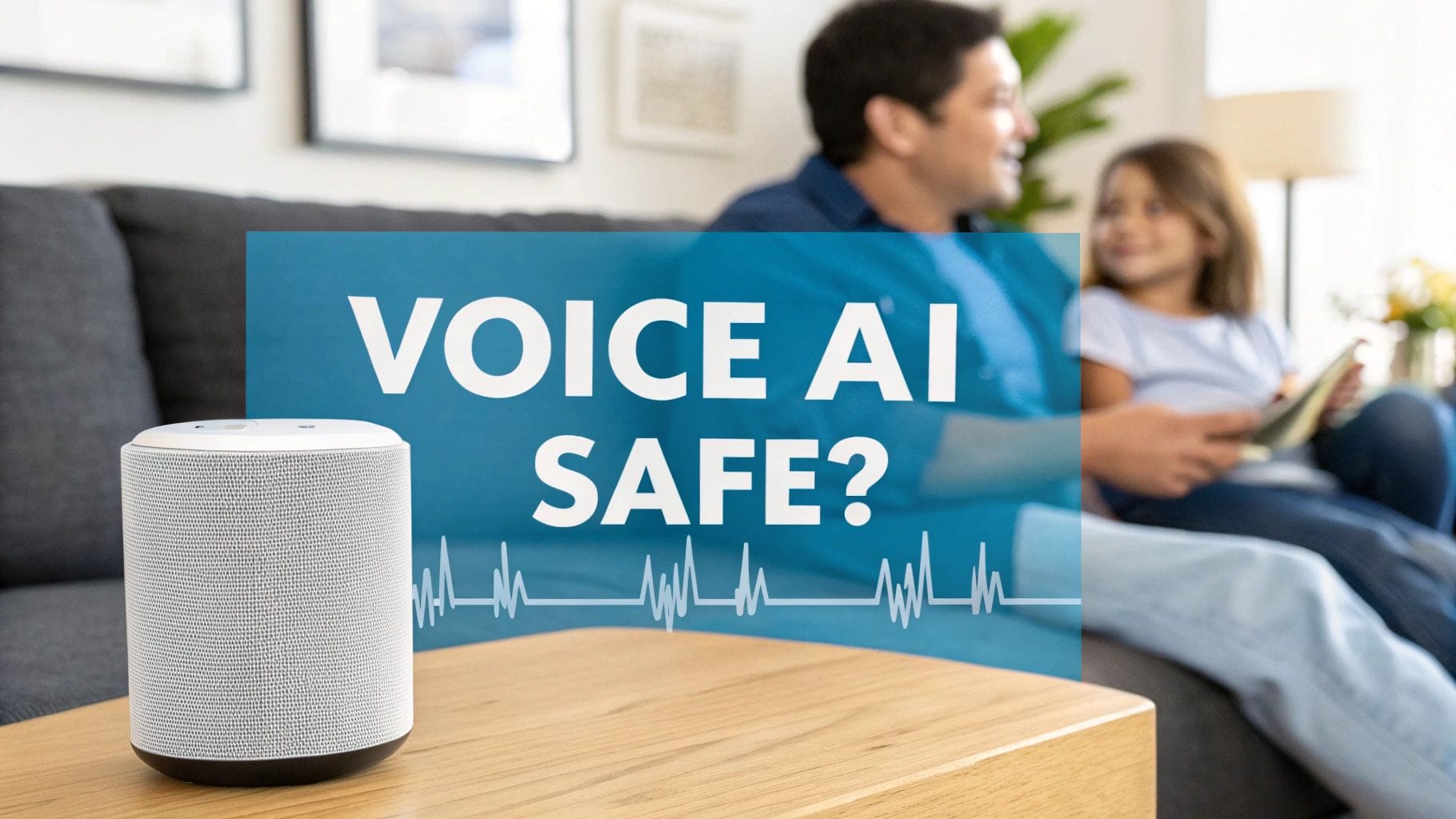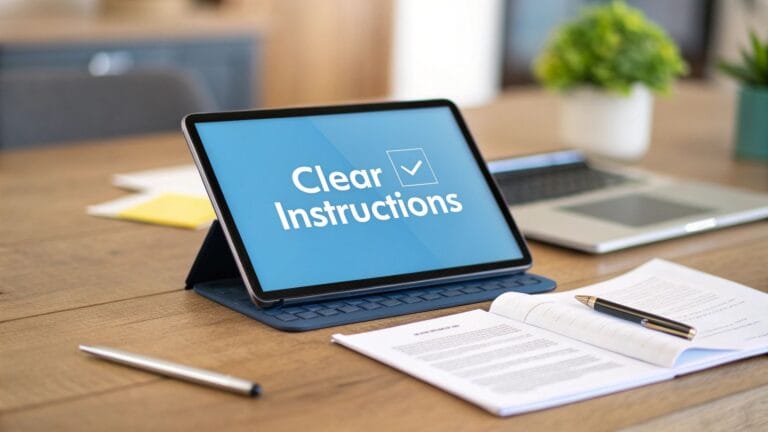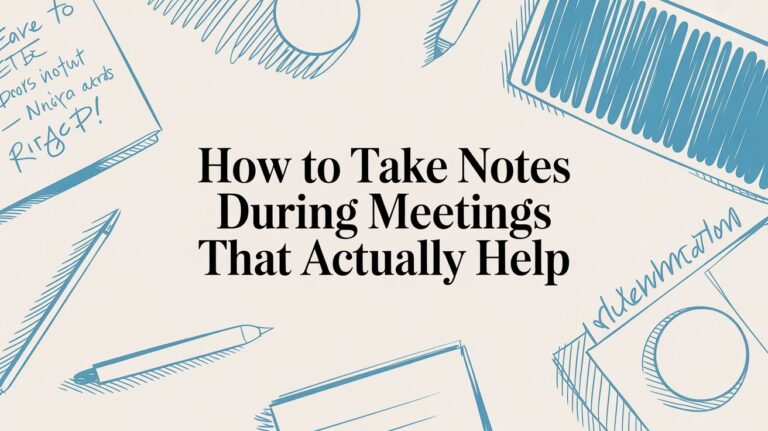Is Voice AI Safe? A Guide for Your Family
Is voice AI safe? That’s a big question. The answer is, it's a little of both. Think of voice AI like a pair of scissors. In the right hands, scissors can help you make cool art. But in the wrong hands, they can be dangerous.
Being safe doesn't mean you can't use it. It means learning the rules so you can use it the right way.
What is Voice AI?
Voice AI is the smart helper in phones and speakers, like Siri and Alexa. It hears what you say, figures it out, and does it. It can play your favorite song or tell you if it will rain. It’s also the magic behind apps that can make you sound like a robot or a famous person.
But there are two sides to this. Voice AI makes life easier, but it also makes us think about staying safe. The biggest worry is voice cloning. That's when someone makes a copy of your voice to trick people.
Voice AI is about trust. To use it safely, you first need to know how it works and what the dangers are.
The Good, The Bad, and The Tricky
To know if voice AI is safe, we have to look at how people use it. The AI itself isn't good or bad. The person using it decides that.
Let's break it down:
- The Good Side: In a hospital, a doctor can use voice AI to write down notes. This lets the doctor spend more time with sick people instead of on a computer. It's also the power behind speech-to-text software that helps people write by talking.
- The Bad Side: Some people use this same tool to make fake sounds. Imagine a bad guy copying your mom's voice to ask you for money. Or someone making a fake recording of your teacher saying something silly. This is where it gets dangerous.
Voice AI Safety in a Nutshell
Here is a simple chart to show you when voice AI is safe and when you need to be careful.
| How You Use Voice AI | Is It Safe? | How to Be Careful |
|---|---|---|
| Smart Helpers (Siri, Alexa) | Yes | Use a strong, secret password for your accounts. Check the safety settings. |
| Fun Voice Changing Apps | Mostly | Only use apps from trusted stores. Don't share private recordings. |
| Fake Voice Scams | No | If someone calls asking for money in a hurry, check with them another way (like a video call) before you do anything. |
| Doctor's Notes | Yes | The program should have special locks to keep what you say private and safe. |
In the end, being safe means knowing what's going on. This tool will keep getting smarter. It's a good idea to learn how Artificial Intelligence shapes online identities and how to protect yourself online.
How Bad Guys Can Use a Copy of Your Voice
Your voice is special, like your fingerprint. But with today’s AI, a bad guy can make a perfect copy of it. This is called a voice clone. All they need is a little bit of you talking. They can get it from a video you posted online, a voicemail, or even a quick phone call.
Once they have a copy of your voice, they can trick people. Imagine them calling your grandpa. They could sound just like you and say, "I'm in trouble! I need money right now!" Your grandpa might get scared and send money before he thinks. This is why we ask, is voice AI safe? A fake voice is like a perfect mask for a bad guy.
The Perfect Mask for Tricks
Crooks are getting very tricky with fake voices. It's not just about asking for money anymore. They use voice copies to pull off big scams that make it hard to know what's real.
Here are a few tricks they use:
- Fake Trouble: This is a new twist on an old trick. The bad guy pretends to be a family member. They might say they are in jail or at the hospital. They make it sound super urgent so you send money without thinking.
- Boss Scams: A bad guy could copy a boss's voice. Then they could call someone at work and say, "Send money to this account right away!" If it sounds like the boss, people might not ask questions.
- Spreading Lies: Think about the trouble someone could cause by making a fake recording of your town's mayor. They could make it sound like the mayor said something mean that they never really said.
The scary part is how real it sounds. The AI can even add sounds of crying or fear to make the fake story seem more real.
This isn't just a story from a movie. It's happening now. Bad guys are using fake AI voices more and more. In just one year, the number of these scams went up a lot. Now, fake voices are used in about 6 out of every 100 attempts to trick people. You can learn more with these AI cyber attack statistics on tech-adv.com to see how big this problem is.
This picture shows how voice AI works. Bad guys can use these same steps to trick us.
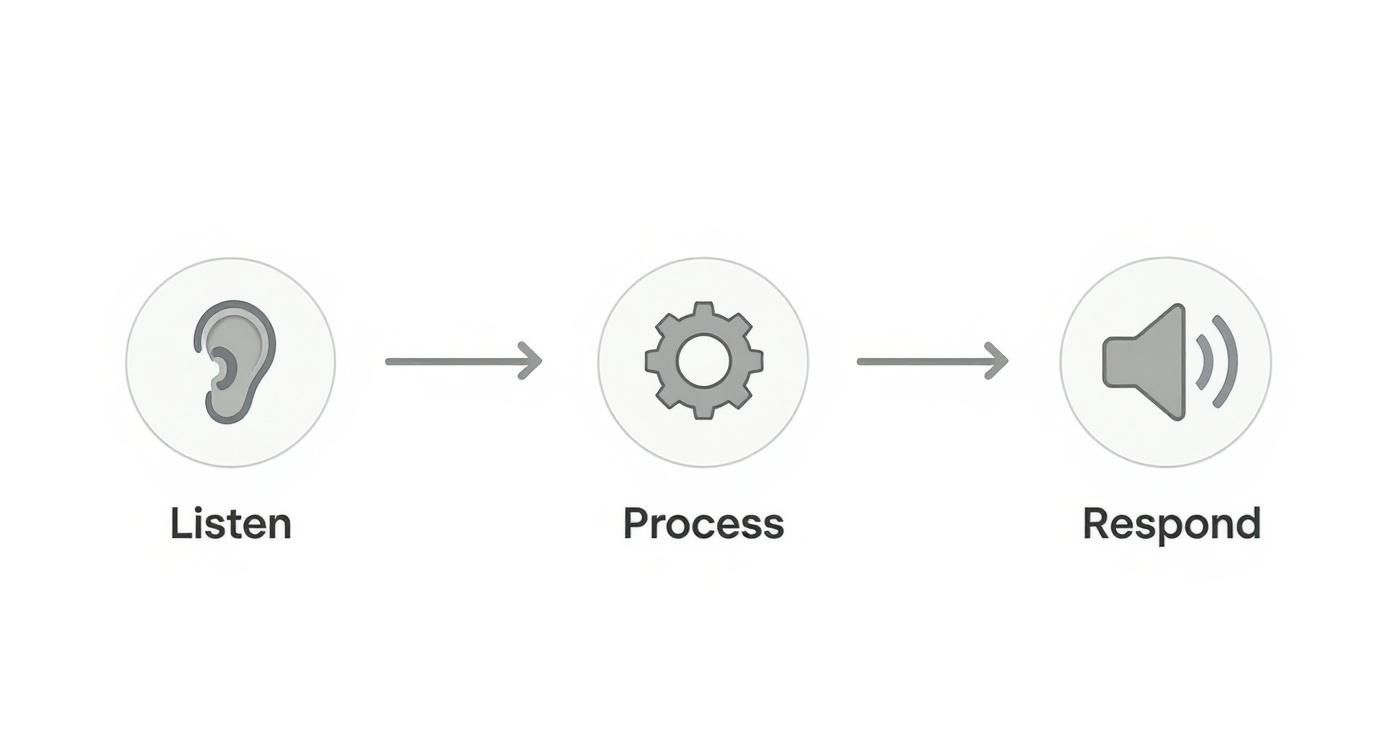
As the picture shows, the AI can listen, think, and then talk. This is how it can copy a person's voice so well to do bad things.
Why Is This Happening Now?
So, why is this a problem now? Because the tools got easy to use. It used to take a lot of money and smart people to copy a voice. Now, anyone can do it with a simple app. It's easy for anyone to try.
Because it's so easy, more bad guys are using it. Knowing how they do it is the first big step to keeping you and your family safe from this new kind of trick.
Why Don't Voice AI Tools Have Safety Locks?
Have you ever wondered why it seems so easy for someone to copy a voice? A big reason is that many voice AI tools are made without safety locks. It's like building a new house but forgetting to put a lock on the front door. Anyone can just walk in.
This is a huge problem. Lots of programs you can find online let you upload anyone's voice and make a perfect copy. The shocking part is that they don't ask you to prove you have permission to use that voice. This makes it hard to answer "is voice AI safe."
Forgetting to Build a Fence
Think about a safe playground. It has fences to keep kids from running into the street. It has soft ground in case you fall. And it has rules so everyone can play nicely. Many voice AI tools are like a playground with none of these things. There are no fences and no rules.
The people who made these tools were focused on making them work really, really well. But they didn't think enough about how people could use them to hurt others. They built the fun slides but forgot the safety gates. This is a big reason why copying voices has become such a big danger so fast.
The biggest problem is that these tools treat every voice the same. They can't tell if a recording is one you said was okay to use, or one that was taken from your social media page.
It's very common for these tools to have no protection. In fact, a team checked six popular voice AI tools. They found that four of them did not have simple safety features to stop people from using them in bad ways. This lets bad guys make fake voices to trick people or spread lies. You can read the full report about these AI voice cloning companies to see how big the problem is.
The Race to Be First
Another big problem is speed. Many companies are in a race to put out the newest AI tools. In this race, safety checks can slow them down. So, they skip them or say they will add them later.
This leaves a big gap where a powerful tool is out there for everyone to use before it's safe. The result? A world where your voice can be copied in just a few clicks, without you even knowing. This is a key problem for tools that need good speech-to-text accuracy but also need to keep you safe.
So, what are these tools missing?
- Asking for "Okay": A simple step that makes a person prove they own the voice they want to copy.
- Secret Stamps: A hidden mark in the sound that shows it was made by an AI.
- Clear Rules: Strong rules that ban people who make bad or fake voice copies.
Without these things, it's up to us to be extra careful.
Are Voice Changer Apps Safe?
Voice changer apps are a lot of fun. Gamers and people who make videos use them to sound like a robot or a movie star. But behind the fun, there is a big question: are they safe to use? The short answer is mostly, but you need to know about the hidden dangers.

Think of your computer's brain. Some of these apps need a lot of brainpower to run. This can make your computer get too hot and crash. A crash is more than just annoying. You could lose your homework or even break important computer files.
Then there's the money part. Many apps let you try them for free. But if you want to stop, they can make it very hard. Some companies make the "cancel" button hard to find. They hope you'll just give up and keep paying. Soon, you're paying for an app you don't even use.
The Hidden Dangers in Your Downloads
Computer problems are one thing. But the real trouble comes from where you get the app. It's safest to use official app stores. Getting apps from other websites is like letting a stranger into your house. You don't know what they will do.
Many of these "free" apps from strange websites come with bad surprises.
- Malware: This is bad software that hides on your computer and steals your private information, like passwords and bank account details.
- Adware: This is less mean but very annoying. It fills your screen with pop-up ads. It can make your computer slow and hard to use.
- Spyware: This is the scariest one. Spyware can watch everything you do, see every key you press, and even turn on your camera and microphone without you knowing.
When we ask, "is voice AI safe," the answer often depends on where you got it. An app from a real company is usually okay. A "free" version from a random website could cause big problems.
The Problem with Power-Hungry Apps
Even a good app can cause trouble if it's too powerful. Take Voice.ai for example. It's a popular and mostly safe tool that people use for fun projects.
But it needs a lot of computer power. The app makes your computer work very hard, especially its graphics card. This can make the computer overheat and crash. This can break your files and make your computer weak to other dangers. You can learn more about the safety of Voice.ai and see if your computer is strong enough to handle it.
Simple Steps to Stay Safe from Voice Scams
Knowing the dangers of voice AI is the first step. Protecting yourself is even easier. It's like learning to look both ways before you cross the street. A little bit of smarts can keep you very safe.
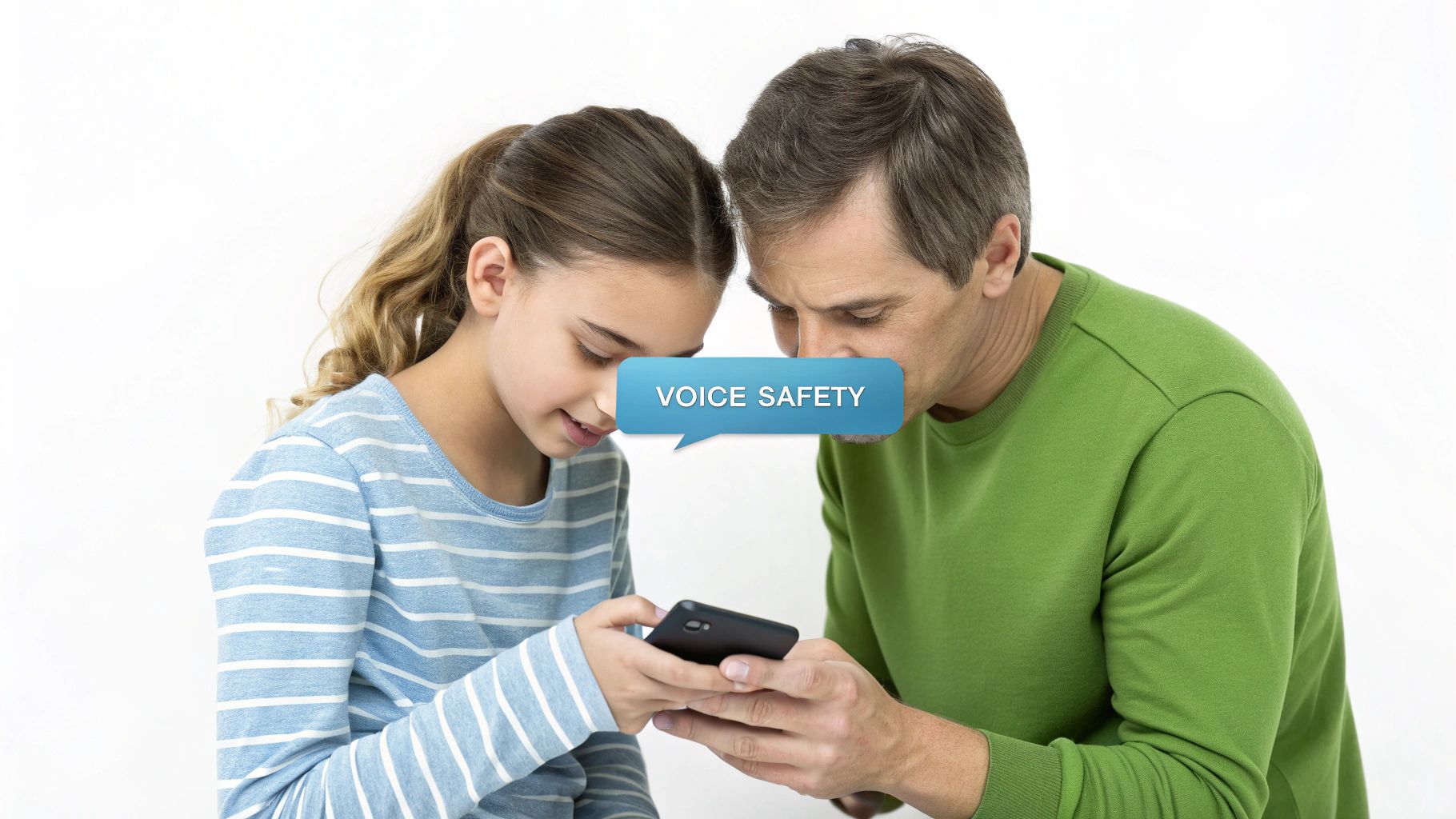
You can start being safer today. These easy habits can make a huge difference in keeping you and your family safe.
Create a Family Safe Word
One of the smartest and easiest tricks is to make a family safe word. This is a secret word that only your family knows. Pick a word that is special and easy to remember, but hard for a stranger to guess.
If you ever get a scary call from someone who sounds like a family member asking for money, just stop. Ask them for the safe word. A real family member will know it right away. A bad guy will be stuck. You'll know right away it's a trick.
A safe word is like a secret password. If the person on the phone doesn't know it, you don't trust them. It doesn't matter how real they sound.
This simple step works so well because it's a secret that bad guys can't find online. It's your family's private key for trust.
Think Before You Share Your Voice
We don't always think about it, but your voice is private information. It's like your birthday or your address. Every time you post a video of yourself talking, you put a piece of your voice out into the world. Bad guys only need three seconds of your voice to make a copy that sounds like you.
It's time to be more careful about where you share your voice.
- Be careful on social media: Before you post a video where people can hear you talking, think about who can see it. You can make your account private so only your friends can see it.
- Watch out for strange calls: If you get a call from a number you don't know, and they ask weird questions to keep you talking, just hang up. They might be trying to record your voice.
- Don't say "yes": Bad guys love to ask questions to make you say "yes," like "Can you hear me?" They can record you saying "yes" and use it to buy things or change your accounts.
Protecting your voice is an important part of staying safe online. The same is true for your writing. Hiding private words from things you write down is also important. A PII redaction tool is a good example of a tool that helps keep your written words safe.
How New Rules Are Making Voice AI Safer
You’re not the only one who is worried about fake voice scams. The good news is that leaders and big companies are working together to make new rules for AI. They want to stop people from having their voices stolen and used for bad things.
Think of it like putting fences and lifeguards at a swimming pool. These new rules are like the fences. They make it much harder for bad guys to cause trouble. This helps make the answer to "is voice ai safe" a much more happy "yes."
A big part of this is making companies build better "locks" for their AI tools. They can't just let anyone copy a voice. First, they have to prove they are allowed to use it. Just like you need a key for your house, people now need to prove they own a voice before an AI can copy it.
Building a Safer Internet Together
Besides rules, companies are also making smart tools that can find fake voices. This new tech can listen to a call and find tiny clues that show a voice is not real. This helps stop bad guys before they can do any harm.
These new rules are making companies act safer. Here’s how:
- Proving It's You: Many tools now make you read a new, random sentence out loud. This simple check proves you are a real, live person and not just a recording of someone else.
- Digital Watermarks: Companies are putting invisible "stamps" on sounds made by an AI. These stamps make it easy for other tools to tell if a voice is real or fake. This is very important for stopping lies from spreading.
These are not just nice ideas. They are becoming the new rules for everyone. Companies that don't follow them can get into big trouble. This makes everyone put safety first.
This new focus on safety is already helping. Smart people are now trying to build AI that is safe and fair from the very start. This is extra important when AI is used in places like schools and hospitals. It's a team effort, and all these changes are making our online world safer, one step at a time.
Your Top Questions About Voice AI Safety, Answered
New tools always bring new questions. Let's answer some of the top worries people have about voice AI safety with simple, clear answers.
Can Someone Really Steal My Voice From a Phone Call?
Yes, they can. This is a real danger that is getting bigger. A bad guy only needs a few seconds of your voice from any phone call. With that, they can make a fake voice that sounds a lot like you.
Think about those weird calls from numbers you don't know. Sometimes they ask strange questions to keep you talking. They might be trying to get a sample of your voice. The safest thing to do is just hang up.
How Can I Tell if I'm Talking to a Fake AI Voice?
Fake AI voices are getting very good, but they sometimes make little mistakes. Listen for a voice that sounds a little flat or doesn't have the same up-and-down feeling as a real person. You might also hear strange pauses or weird sounds in the background.
Your best defense is to be a little suspicious. If you get a panicked call from someone asking for money—even if it sounds just like your mom or dad—hang up. Then, call them back using a phone number you know is theirs. This will tell you if the emergency is real.
Are My Smart Speakers Listening to Everything I Say?
Smart speakers like Alexa and Google Home are always "on," but they are not always "listening." They are waiting for you to say a special "wake word" (like "Alexa"). Only after they hear that word do they start recording what you say to answer your question.
If you want to be sure they are not listening, there is a very simple fix: the mute button. Every smart speaker has a button that turns the microphone completely off. When that button's light is on, the speaker cannot hear anything until you turn it back on.
Ready to get more done without typing? See how WriteVoice can turn what you say into perfect text in any app. It's four times faster than typing! Try WriteVoice for free and see how much time you can save.

